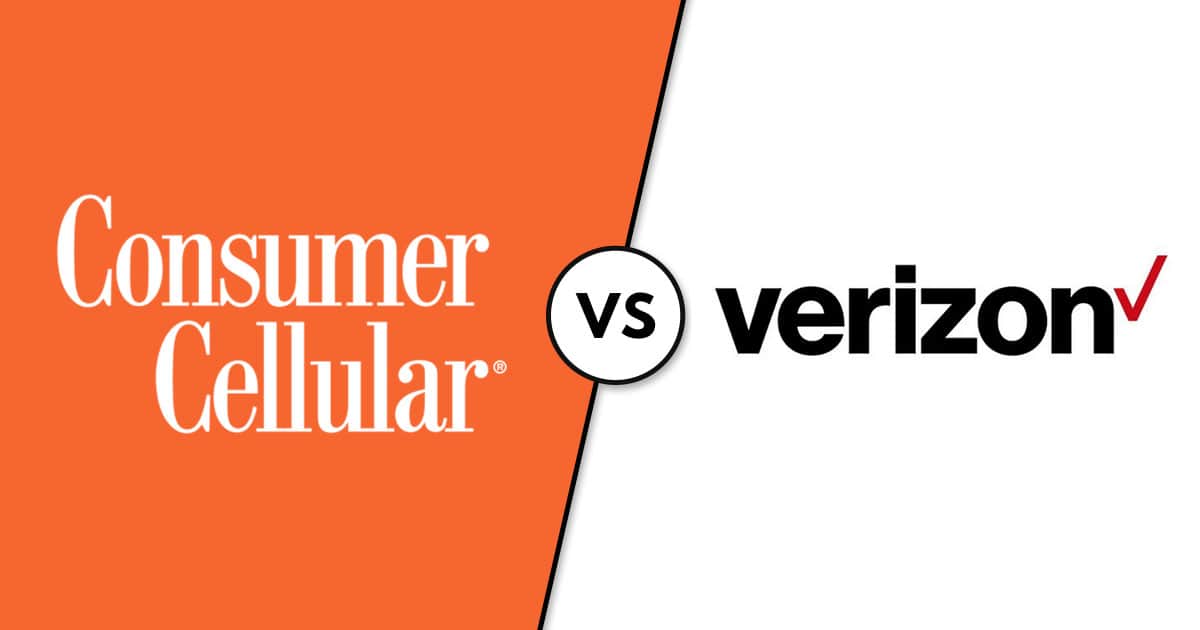Choosing a wireless carrier involves balancing cost, coverage, features, and customer service. Two frequently compared options in the US market are Consumer Cellular and Verizon Wireless. While both offer nationwide service, they cater to different audiences and operate on fundamentally different network structures. Understanding the consumer cellular vs verizon differences is key to finding the right fit.

Network Coverage: A Critical Distinction
This is perhaps the most important difference between the two providers:
- Verizon: Operates its own extensive, nationwide 4G LTE and 5G network infrastructure. It’s known for its widespread coverage, particularly its strong 4G LTE reach, often cited as leading in overall reliability and population coverage. Verizon also offers high-speed 5G Ultra Wideband in many areas.
- Consumer Cellular: Operates as a Mobile Virtual Network Operator (MVNO). This means it does not own its own cellular network. Instead, Consumer Cellular primarily leases network capacity from AT&T and also has agreements to use T-Mobile’s network. Crucially, Consumer Cellular does NOT primarily use the Verizon network. While AT&T and T-Mobile also offer excellent nationwide coverage, it’s different infrastructure than Verizon’s.
Takeaway: If you specifically need coverage on Verizon’s network, Consumer Cellular is not the right choice. If coverage on AT&T or T-Mobile works well for you, then Consumer Cellular becomes a viable option based on other factors. Always check the coverage maps (AT&T’s and T-Mobile’s for Consumer Cellular, Verizon’s for Verizon) for your specific locations.
Read more about: nurse discount verizon
Target Audience and Plan Philosophy
The carriers approach the market with different customers in mind:
- Consumer Cellular: Primarily targets the 50+ demographic and AARP members, emphasizing simplicity, affordability, and highly-rated US-based customer service. Their plans are flexible, often featuring shared pools of talk/text/data, making them ideal for users with predictable, often lower-to-moderate data needs.
- Verizon: Caters to a broad market, including individuals, families, and heavy data users. Their focus is often on feature-rich Unlimited plans with premium data, large hotspot allowances, optional entertainment perks, and access to their fastest 5G Ultra Wideband network on higher tiers.
Plan Structures and Pricing
The differences in target audience are reflected in their plan offerings:
- Consumer Cellular:
- Structure: Offers simple plans typically starting with unlimited talk and text, paired with specific data buckets (e.g., 1GB, 5GB, 10GB, Unlimited [with ~50GB high-speed limit]). Additional lines are usually a flat monthly fee (e.g., $15/mo) and share data on capped plans.
- Pricing: Generally very affordable, especially for lighter data users or single lines. Plans start around $20/month. An exclusive AARP 2-line unlimited plan is often available around $55/month. Taxes and fees are typically extra.
- Discounts: Offers a 5% monthly discount on service for AARP members.
- Verizon:
- Structure: Primarily offers tiered Unlimited postpaid plans (Unlimited Welcome, Unlimited Plus, Unlimited Ultimate) under their “myPlan” system, allowing perk add-ons for $10-$15/mo each. Also offers prepaid plans.
- Pricing: Generally more expensive than Consumer Cellular, especially for single lines or lower data usage. Postpaid unlimited plans start around $65/month for a single line (with Auto Pay, before taxes/fees). Significant per-line discounts apply for multiple lines.
- Discounts: Offers discounts for Auto Pay, multi-line accounts, and potentially bundling with home internet (Mobile + Home). Specific discounts exist for military, first responders, nurses, teachers, and students (Florida only for 55+ plan).
Features and Perks
- Consumer Cellular: Focuses on core functionality. Includes mobile hotspot usage (uses plan data), unlimited talk/text to Mexico/Canada. Lacks bundled streaming perks or large high-speed hotspot allowances found on premium postpaid plans. International roaming options are limited and typically pay-per-use.
- Verizon: Higher-tier plans offer premium data (less likely to slow during congestion), 5G Ultra Wideband access, significant high-speed mobile hotspot allowances (e.g., 30GB-60GB), optional bundled perks (Disney Bundle, Apple One, etc.), and more robust international travel options (like TravelPass).
Phone Selection
- Consumer Cellular: Offers a curated selection including easy-to-use flip phones (like the Iris Flip) and popular smartphones from Apple, Samsung, and Motorola. Allows customers to bring their own compatible, unlocked device (BYOD).
- Verizon: Sells a wide range of the latest flagship devices, mid-range phones, and basic phones, often with 36-month financing options tied to plan promotions. Also supports BYOD.
Customer Service
- Consumer Cellular: Highly regarded for its US-based customer support and consistently ranks at the top in customer satisfaction surveys (like J.D. Power) among value MVNOs. Support is available via phone and online chat.
- Verizon: Offers support via phone, chat, app, website, and physical retail stores. Customer satisfaction rankings are generally good but often trail top MVNOs like Consumer Cellular in surveys focused purely on service experience.
Conclusion: Consumer Cellular vs Verizon – Which is Better for You?
The answer to “is at&t better than verizon?” depends entirely on your needs:
- Choose Consumer Cellular if: You prioritize affordable pricing (especially for low-to-moderate data use), value top-rated, US-based customer service, are an AARP member seeking discounts, need simple and flexible plans, and have good coverage with the AT&T or T-Mobile networks in your area.
- Choose Verizon if: You need access specifically to Verizon’s network for coverage/reliability, want premium features like large high-speed hotspot allowances or 5G Ultra Wideband speeds, desire bundled entertainment perks, or benefit from their specific phone financing deals and promotions (often requiring postpaid Unlimited plans).
Ultimately, the consumer cellular vs verizon choice involves deciding between a value-focused MVNO known for service on the AT&T/T-Mobile networks, and a premium network operator with more features but generally higher costs.